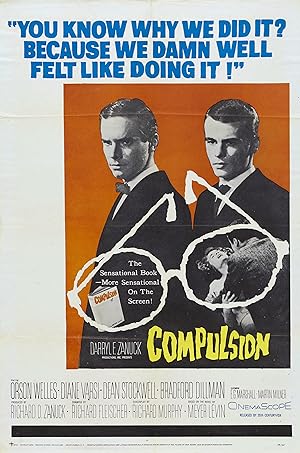Compulsion, a black and white film, was released subsequent to Alfred Hitchcock’s Rope, but was based on the same crime, which I was unaware of before watching the film. Compulsion reminded me of an extra long episode of Law & Order: Criminal Intent. The movie initially focuses on the two men’s destructive relationship then broadens its scope to include their friends, one of whom happens to be a reporter. Then it segues into a relationship between the reporters as more effective in solving the crime than the detectives and ultimately the DA outwits them. The last third of the film focuses attention on their defense and is the strongest part of the film.
Compulsion suffers from lack of focus and a central character that is sufficiently interesting enough to sustain interest throughout the entire film. While the constant shifting of perspective may have been exciting for audiences at the time so they could comprehensively get an omniscient view of the case, it only delays the best part of the movie. When Orson Welles appears after one hour 5 minutes in the one hour forty-three minute film, he steals the film and the moral high ground as the defense attorney. I would actually encourage viewers to skip ahead to the best part of the film. Unfortunately that means you will still encounter a random KKK persecution moment in a film without any overt minorities unless the killers are supposed to be seen as Jewish, which was not obvious to me.
Some aspects of Compulsion’s narrative age better than others. There is a homoerotic subtext to the killers’ relationship, and homosexuality is clearly shown as the foundation of their venality. The younger killer is described as not liking baseball or chasing girls and enjoys taking orders from the older killer. His salvation lies in his ability to have a relationship with a girl, which the older killer notices and orders him to rape her.
The attempted rape subplot is one of the most egregious depictions of sexual violence that I have ever seen in a movie. If people lost their minds during Game of Thrones when they thought Sansa’s rape was only used as a tool to create character development for a male character, those same people would have been correct to riot in the streets after watching Compulsion. Heterosexual sex and rape are discussed quite frankly for an old film, but the sensibilities are still negative against women. If I’m feeling charitable, I would say that she shows Christ levels of forgiveness and turning the other cheek when the character is more concerned about the soul of her attempted rapist than her own safety, but I’m not so I would suggest that it was misguided male writers who had little to no understanding of rape and were looking for a way to elicit sympathy for the killers.
I don’t think that a lot of the rhetoric used to discuss morality would hold up in a debate if it occurred today. Early in Compulsion, there is a law school class, and the professor and the younger killer discuss whether or not leaders should be above the law. The professor argues that none of the great men that he cites in his lecture, including Moses, failed to respect the law or the rights of the individual therefore no. In the post-modern world, we accept and expect that men of note do bad things, but that does not mean they should. It is not the greatness of the man that determines appropriate conduct, but conduct that determines the greatness of the man.
Also Welles’ character, who is modeled on Clarence Darrow, has an amazing closing speech, but there are some glaring holes in his reasoning, which overall is substantially thought provoking regarding parallels between the killers’ and the state’s conspiracy to murder albeit for different reasons. I think that it is a solid exhortation to admonish the state to be better than its citizens and reflect ideals, but it was a bait and switch to conflate the people’s hatred of the two killers because they are rich as if they did nothing to deserve condemnation. People during this time period probably would have recognized allusions to Old Testament about showing partiality for or bias against the rich or poor. Unless people are randomly picking up rich kids and threatening them with capital punishment, he pulled a bait and switch by suggesting that this hatred was based on their wealth, not the cold blooded murder of a child and neighbor. This reasoning, the poor little rich boy trope that runs throughout Compulsion, cheapens an otherwise provocative and convincing closing argument.
At one point, the older killer spins a tale that his parents won’t attend the trial because it would upset their routine, but they are present through the whole thing. Compulsion is as complicit or gullible as the cops in taking the killers at their word instead of comparing it to readily available contradictory evidence of the reality before our eyes as represented in the film. The killers are never truly challenged with the fiction that they are superior, above emotion and logical even though it is apparent that they are none of these things. The underlying sentiment is what a tragic waste of potential instead of that they were always garbage, but no one noticed because they used big words to take the legitimate, enormous pain that exists in the world to excuse the comparatively small amount of pain that they chose to add to it.
Stay In The Know
Join my mailing list to get updates about recent reviews, upcoming speaking engagements, and film news.





